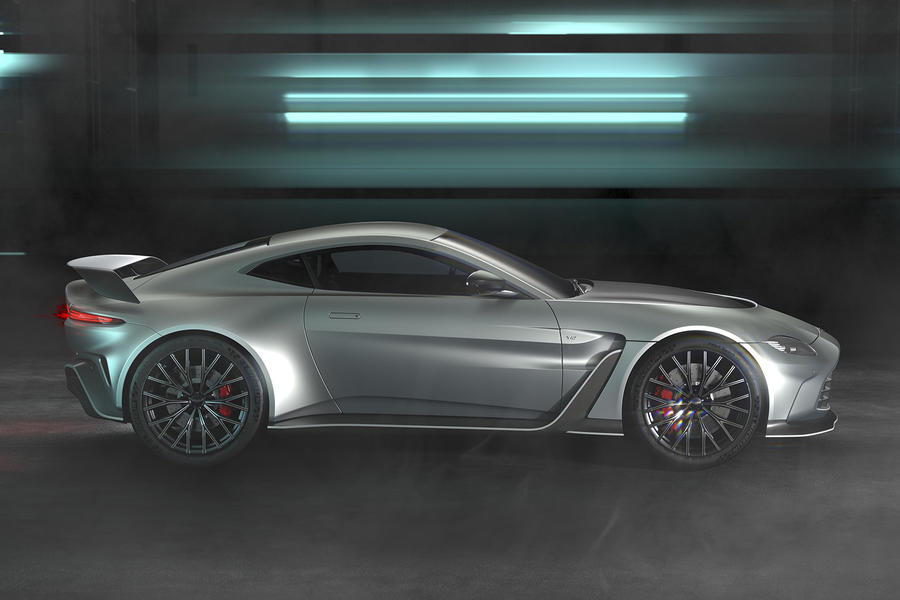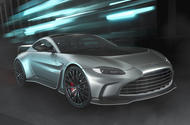Thumping 12-cylinder engine installed in Porsche 911 rival; all 333 examples sold for upwards of £265,000
Aston Martin has revived the hallowed V12 Vantage name for a commemorative and highly exclusive range-topping edition of its two-seat sports coupé, promising substantially enhanced performance over the standard V8 car.
The British firm will build just 333 examples of the new Aston Martin V12 Vantage, all of which were sold prior to its unveiling for a starting price of £265,000 – £123,000 more than the previous range-topping Vantage F1 Edition.
It’s the third and final V12-engined Vantage that Aston Martin will ever build.
It uses the same 5.2-litre twin-turbocharged 12-cylinder engine as the Aston Martin DB11 and Aston Martin DBS but in a bespoke state of tune that endows it with 690bhp and 555lb ft – enough to send it from 0-60mph in just 3.4sec and on to a 200mph top speed.
“The engine is the heart of every Aston Martin, but never more so than in this,” the company said.
The eight-speed automatic gearbox is carried over from the standard Vantage but recalibrated to give faster shift times and “driver interaction”.
Aston Martin CEO Tobias Moers said the V12 Vantage has been the firm’s “hero car” in recent years and that this latest iteration is a fitting final outing for the name.
“Right from the moment the first V12 Vantage RS Concept was shown back in 2007, our customers and fans around the world fell in love with the idea of fitting our biggest engine into our smallest and most sporting model. The recipe has been refined over the years with great success, but the essence has remained the same”, he said.
“Now it’s time to bring this bloodline to a close, fittingly with the most spectacular example yet: the fastest, most powerful and most dynamically capable V12 Vantage ever.”

The upgrades over the standard Vantage extend far beyond the motor. To go along with the power increase, the V12 Vantage has been radically re-engineered and redesigned in line with its bespoke brief.
Aston Martin has sought to offset the weight of the larger engine with a front bumper, bonnet, wings, sills, rear bumper and deck lid made from carbonfibre and lightweight battery and exhaust systems, the latter of which saves 7.2kg alone.
The company claims a power-to-weight ratio of 385bhp per tonne – a 20% increase over the standard model. That puts the V12 Vantage at roughly 1795kg, some 165kg heavier than the V8 car but with a 20% greater power-to-weight ratio.
It’s stiffer, too: the suspension’s spring rates have been increased by 50% at the front and 40% at the rear, while the top mounts are 13% stiffer and the anti-roll bars 5% stiffer at the front (but 41% softer at the rear). The body itself has been made more rigid courtesy of a new strut brace and fuel-tank brace at the rear, which boosts stiffness by 8%.
Aston Martin claims the V12 delivers sharper turn-in response courtesy of a newly calibrated steering system, while lightweight, high-durability carbon-ceramic brake discs boost stopping power while also saving 23kg.
The transformation is most immediately obvious from the V12’s visual makeover, though. Its track has been widened by 40mm at each end to boost cornering stability, there’s a radical new front-end treatment with a bespoke (25% larger) grille and full-width splitter, the bonnet now hosts a massive horseshoe-shaped cooling intake and the rear end houses a new centre-exit exhaust, a race-style diffuser and a sizeable rear wing that adds 204kg of downforce at top speed.
The revamp is subtler inside, with the V12 car marked out mostly by its carbonfibre seats – claimed to save another 7.3kg over standard.
However, Aston Martin has emphasised that the personalisation options offered by its Q bespoke service mean that “it wouldn’t be a surprise to see no two cars the same”.
Moers has previously hinted to Autocar that Aston Martin’s V12 could be deployed in more new models after the new Vantage variant. “The V12 still has a bit of potential”, he told us. “Having the V12 Vantage shows there’s still room for a V12 in our sports car generation.”
Aston Martin is one of just a handful of manufacturers still building V12-engined cars.
Ferrari has committed to maintaining a 12-cylinder engine option in its line-up for the foreseeable future, Lamborghini will replace the Aventador with a new V12 hybrid next year, Rolls-Royce will keep its BMW-derived unit on sale until it goes all-electric in 2030 and the ultra-luxurious Mercedes-Maybach S-Class continues to use the firm’s 6.5-litre unit.
Source: Autocar
